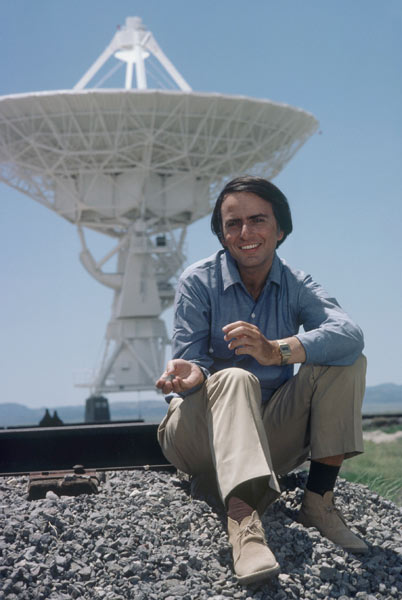 As Seth MacFarlane uses some of his Family Guy wealth to reboot Cosmos on Fox, Joel Achenbach of Smithsonian magazine looks back at the show’s original host, Carl Sagan, who was something of an ambassador to his own country in the 1970s, a populist professor coaxing Americans through the shock and awe of the post-Space Race with serious scholarship, talk-show schmoozing and provocation. An excerpt:
As Seth MacFarlane uses some of his Family Guy wealth to reboot Cosmos on Fox, Joel Achenbach of Smithsonian magazine looks back at the show’s original host, Carl Sagan, who was something of an ambassador to his own country in the 1970s, a populist professor coaxing Americans through the shock and awe of the post-Space Race with serious scholarship, talk-show schmoozing and provocation. An excerpt:
“The Sagan archive gives us a close-up of the celebrity scientist’s frenetic existence and, more important, a documentary record of how Americans thought about science in the second half of the 20th century. We hear the voices of ordinary people in the constant stream of mail coming to Sagan’s office at Cornell. They saw Sagan as the gatekeeper of scientific credibility. They shared their big ideas and fringe theories. They told him about their dreams. They begged him to listen. They needed truth; he was the oracle.
The Sagan files remind us how exploratory the 1960s and ’70s were, how defiant of official wisdom and mainstream authority, and Sagan was in the middle of the intellectual foment. He was a nuanced referee. He knew UFOs weren’t alien spaceships, for example, but he didn’t want to silence the people who believed they were, and so he helped organize a big UFO symposium in 1969, letting all sides have their say.
Space itself seemed different then. When Sagan came of age, all things concerning space had a tail wind: There was no boundary on our outer-space aspirations. Through telescopes, robotic probes and Apollo astronauts, the universe was revealing itself at an explosive, fireworks-finale pace.
Things haven’t quite worked out as expected. ‘Space Age’ is now an antiquated phrase. The United States can’t even launch astronauts at the moment. The universe continues to tantalize us, but the notion that we’re about to make contact with other civilizations seems increasingly like stoner talk.”
________________________
In 1988, Sagan, Arthur C. Clarke and Stephen Hawking on God and other aliens:

